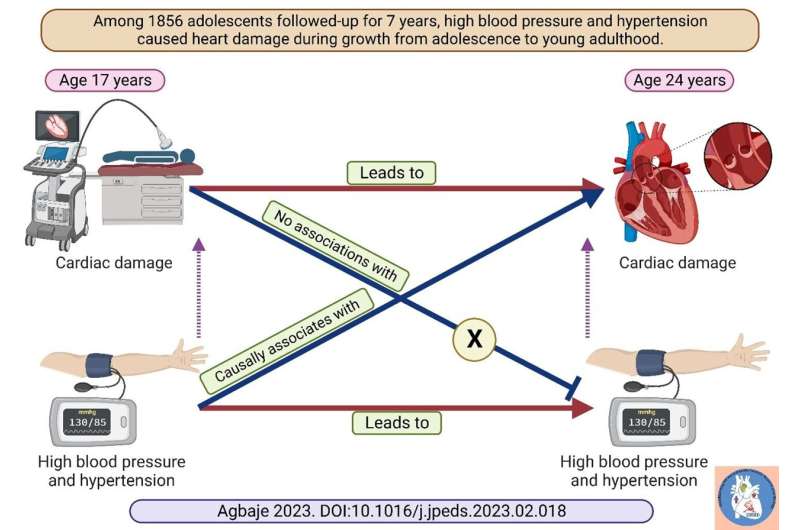This article has been reviewed according to Science X's editorial process and policies. Editors have highlighted the following attributes while ensuring the content's credibility:
fact-checked
peer-reviewed publication
trusted source
proofread
Blood pressure greater than 130/85 mmHg can cause heart damage in adolescents

Elevated blood pressure and hypertension can cause early cardiac damage during adolescence which is worsened by young adulthood, a paper published in the Journal of Pediatrics concludes. The study was conducted in collaboration between the University of Bristol in the U.K. and the University of Eastern Finland.
It is well known that in adults, elevated blood pressure and hypertension are "silent killer diseases" that result in kidney, heart, vascular, and brain damage, and subsequently in death. Annually, hypertension treatment costs billions of dollars in health care worldwide and is associated with rising health emergencies such as heart attack and stroke. The European Society of Cardiology/European Society of Hypertension classifies blood pressure 130/85 mmHg as high-normal and 140/90 mmHg as hypertension. Whereas the American College of Cardiology/American Heart Association classifies blood pressure of 130/80 mmHg as hypertension.
In 2020, the United States Preventive Services Task Force concluded "that the evidence to support screening for high blood pressure in children and adolescents is insufficient and that the balance of benefits and harms cannot be determined."
However, it was reported last year (2022) that increased systolic blood pressure during childhood was associated with the risk of premature death in the mid-forties. Nonetheless, the earliest time revealing potential high blood pressure-related heart damage in a general population of children and adolescents remains unknown. In addition, whether high blood pressure greater than 130/85 mmHg has a causal role in premature heart damage in the young population is unclear due to the lack of repeated echocardiography measurements.
The current study was conducted among 1,856 adolescents of whom 1,011 were female. The adolescents were 17 years old at baseline, and they were followed up for seven years until young adulthood at age 24 years. Elevated blood pressure and hypertension, and evidence of heart damage were assessed at baseline and follow-up. Signs of heart structure damage are left ventricular hypertrophy and high relative wall thickness, whereas signs of heart function damage are left ventricular diastolic dysfunction and increased left ventricular filling pressure.
During the 7-year follow-up period, the prevalence of elevated blood pressure and hypertension and heart damage among adolescents doubled. With extensive control for fat mass, muscle mass, glucose, lipids, smoking status, sedentary time, physical activity, and family history of cardiovascular disease, and using adults' cut points for diagnosing heart damage, it was observed that high blood pressure and hypertension caused premature heart damage in both males and females.
Importantly, there were specific characteristics of elevated blood pressure and hypertension-related heart damage observed in each sex. For example, among males, high systolic blood pressure and hypertension were associated with approximately 10%–30% increased risk of heart function damage but there was no risk of heart structure damage. However, among females high systolic blood pressure and hypertension were associated with approximately 60%–217% increased risk of heart structure damage and 35%–65% increased risk of heart function damage.
"This novel evidence on the deleterious effect of high blood pressure and primary hypertension on the heart of the young population is alarming. Delay in initiating blood pressure screening in adolescence is unjustifiable considering the amount of heart damage and potentially premature death that could be prevented.
"Therefore, public health experts, health policymakers, health journalists and bloggers, pediatricians, and caregivers are encouraged to significantly raise awareness of the critical danger high blood pressure and hypertension pose to young people. There should be a push for legislative changes that enforce blood pressure screening in adolescents, because this may significantly lower hypertension-related emergencies in adulthood," says Andrew Agbaje, a physician and clinical epidemiologist at the University of Eastern Finland.
More information: Andrew O. Agbaje, Elevated Blood Pressure and Worsening Cardiac Damage During Adolescence, The Journal of Pediatrics (2023). DOI: 10.1016/j.jpeds.2023.02.018




















